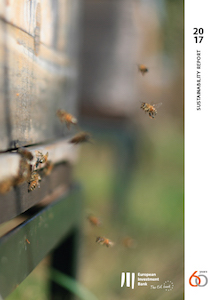Committed to Sustainability
EIB Group¹ Sustainability report 2017
Published 08-14-18
Issued by European Investment Bank
Summary
When the Treaty of Rome entered into force on 1 January 1958, the European Investment Bank was founded. In the 60 years since then, the EIB has contributed significantly to making Europe more open, innovative and sustainable.
Report Highlights
EIB Group¹ Sustainability report 2017
When the Treaty of Rome entered into force on 1 January 1958, the European Investment Bank was founded. In the 60 years since then, the EIB has contributed significantly to making Europe more open, innovative and sustainable.
In 2017, the EIB Group approved a record number of 901 operations, supporting small and medium-sized enterprises, fostering innovation, protecting the environment, enhancing social cohesion and education and helping to build crucial infrastructure. It provided EUR 78.2 billion to help deliver on policy goals in Europe and worldwide, leveraging total investment of around EUR 250 billion by crowding in private capital.
Sustainability lies at the heart of everything the EIB Group does and shapes its activities and investment decisions. This report is a testament to the achievements of the best corporate responsibility standards followed by the EIB Group.
The content of the EIB Group 2017 Sustainability Report is based on the results of a full materiality analysis that was conducted in 2014. The EIB Group continues to lead the way in sustainability reporting.
The EIB Group 2017 Sustainability report is prepared in accordance with GRI Standards comprehensive option and should be read in conjunction with the EIB Group 2017 Sustainability Reporting Disclosures.
In addition, the EIB Group Carbon footprint report on Green House Gas emissions resulting from EIB Group internal operations has also been published. The EIB Group is celebrating over 10 years of reporting on the environmental impact of its operations, which it started in 2007. In addition to energy (natural gas for heating and power generation, purchased electricity, and steam for power) and waste emissions, we also measure and manage our mobility emissions (business travel, employee commuting with own vehicles, etc.). Over the last decade, the EIB has undertaken a number of initiatives to improve disclosure and reduce the environmental impact of its internal operations.
In 2017, the number of EIB Group staff increased by 11.9%, whilst its total net emissions have been growing at a slower rate of 8.8% to 22,024 tCO2e. The continued growth of the business resulted in more business travel activity and notably more flights, which have risen concurrently. Several other emissions sources linked to employee numbers also increased in 2017, such as commuting and minibus emissions.
Despite continued growth in employee numbers creating an increase in total net emissions, the EIB Group is pleased to report a further reduction in its emissions intensity, which fell by 2.8% to 5.98 tCO2e per employee. Though EIB Group employee numbers have more than doubled since the baseline year, emissions intensity has almost halved in the same period and the continued reduction in the emissions intensity of its operations means it remains well ahead of its target to reduce relative emissions by 20-30% by 2020.
The EIB Group provides finance and technical assistance to achieve sustainable, inclusive growth through two complementary entities, the European Investment Bank (EIB) and the European Investment Fund (EIF).
The full details of EIB Group sustainability is available in the report at:
EIB Group Sustainability Report 2017
Contact: CSR Division: CSR@eib.org
1 The EIB Group consist of the European Investment Bank (EIB) and the European Investment Fund (EIF)
European Investment Bank
European Investment Bank
x


